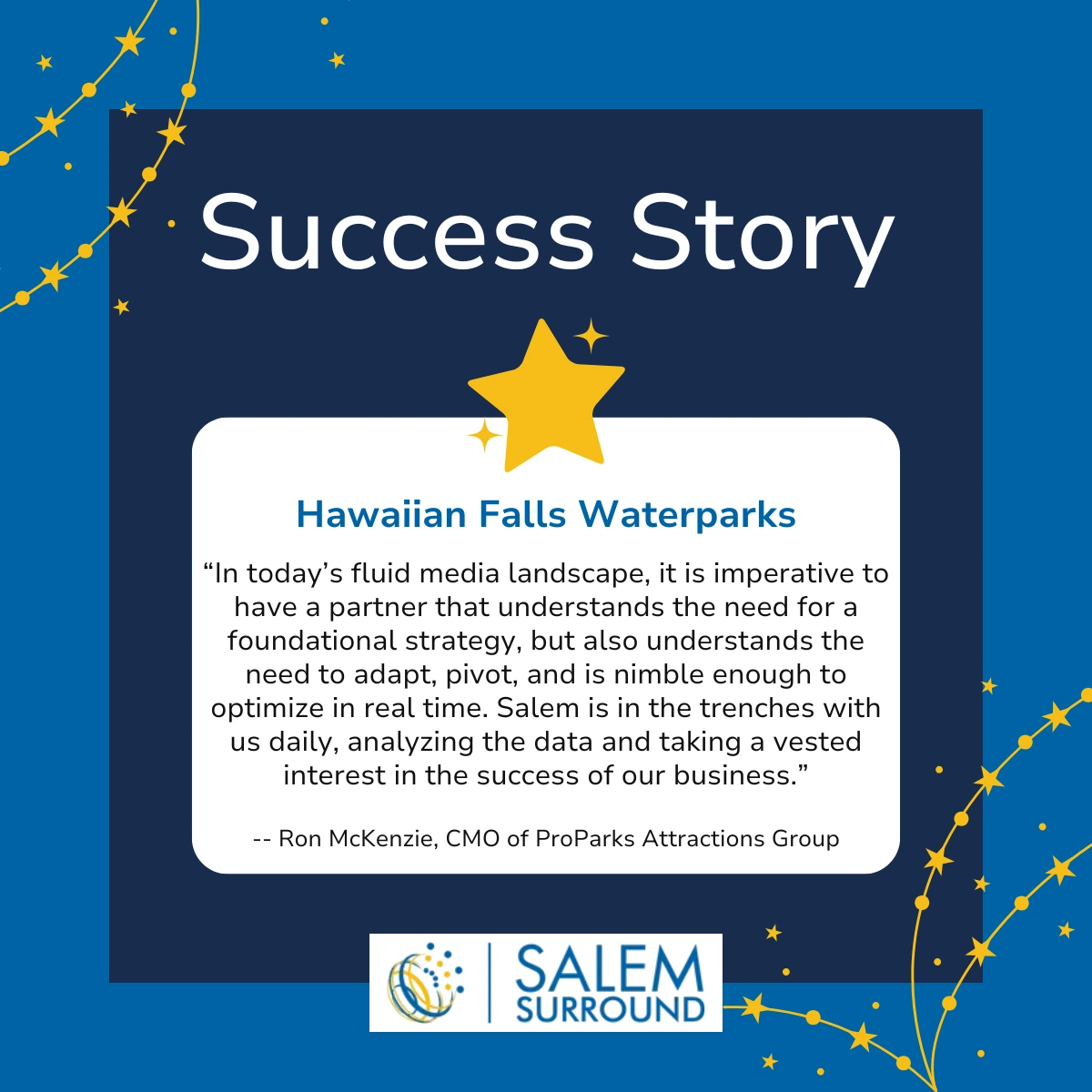Digital Marketing Services for Small and Large Businesses
Digital marketing has redefined how businesses connect with their audiences, making it an essential tool for both small businesses and large enterprises. Whether you're a solo entrepreneur navigating your first online campaign or a seasoned marketing manager seeking to scale operations, digital marketing offers unparalleled opportunities to reach your goals. With strategies like SEO, PPC, social media marketing, and reputation management at your fingertips, you can build up your brand's digital presence, engage customers, and drive measurable results.
This guide will walk you through the types of digital marketing solutions available, why your business needs them, and how Salem Surround can help you take your digital presence to the next level.
How Digital Marketing Services Drive Small Business Growth
Salem Surround's Digital Marketing Services
Benefits of Digital Marketing and Why It’s Important
How to Create a Digital Marketing Strategy
Does Digital Marketing Work for All Businesses?
What Is a Digital Marketing Agency?
If I Hire a Digital Marketing Agency, Who Will I Get?
Should I Hire a Digital Marketing Agency for My Small Business?
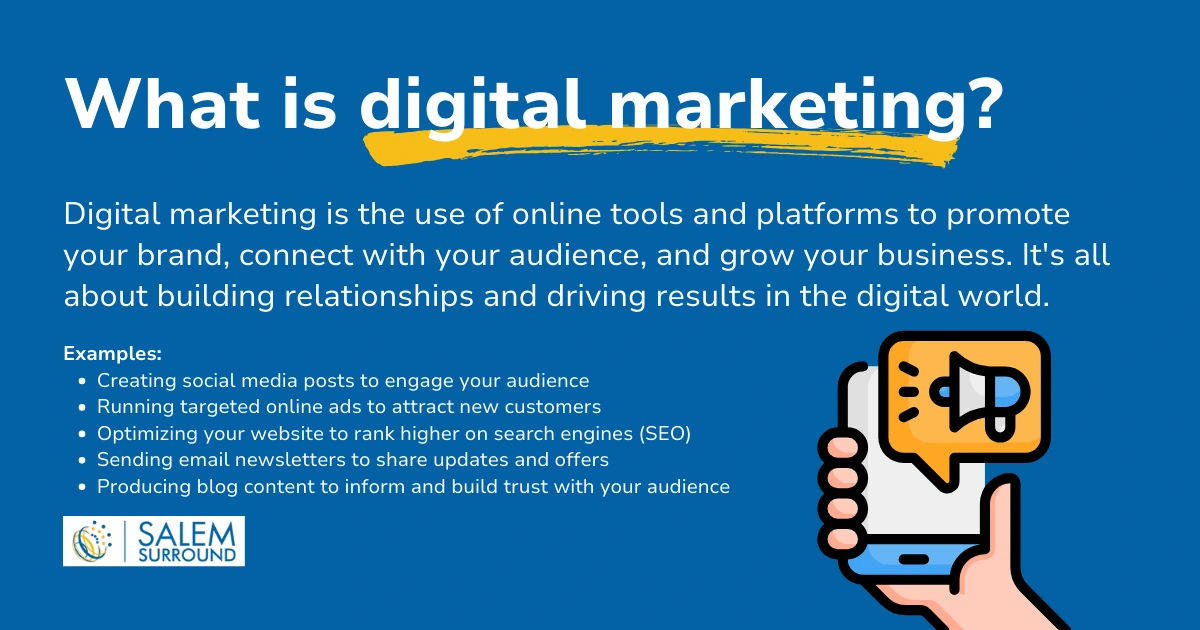
What is Digital Marketing?
Digital marketing refers to any marketing effort that happens on the internet. It includes a broad range of methods, including the use of websites, search engines, social media platforms, email campaigns, mobile apps, and even connected TV. By leveraging these digital channels, businesses can connect with both current and potential customers in a targeted, cost-effective, and measurable way.
Unlike traditional marketing, which often relies on general and less personalized approaches, digital marketing offers unparalleled precision. It allows brands to reach either a global audience or a local niche, ensuring that marketing efforts align with specific business goals. From driving brand awareness to fostering customer engagement, digital marketing has become indispensable in today’s internet-driven world.
How It Stands Apart from Traditional Marketing:
1. Medium
Traditional marketing primarily utilizes offline channels:
- Print media (newspapers, magazines)
- Billboards
- Television
- Radio
- Direct mail
On the other hand, digital marketing leverages online platforms:
- Websites
- Social media
- Search engines
- Mobile apps
- Text messaging
- Connected television
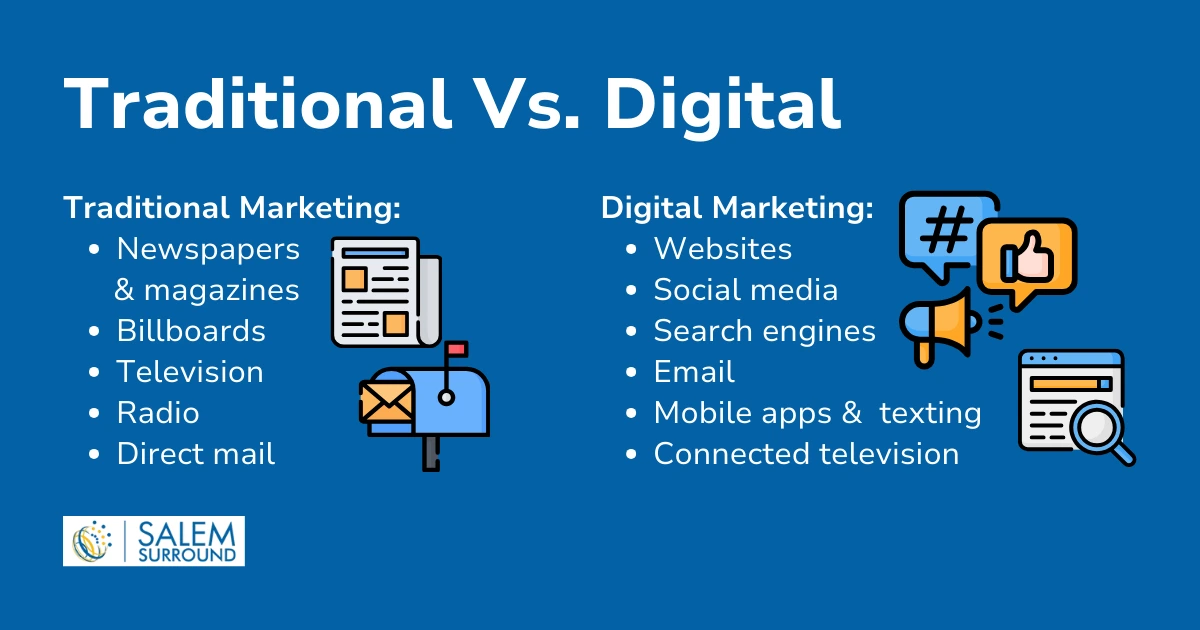
2. Reach
Traditional marketing targets local or regional audiences using methods like billboards, print ads, and direct mail, focusing on specific areas.
Digital marketing, on the other hand, can reach a global audience or target with precision. Businesses can use online platforms to tailor campaigns based on location, age, interests, browsing habits, past purchases, and more.
3. Cost
Traditional marketing can be more expensive (there are LOTS of costs associated with printing materials and purchasing ad space).
Digital marketing is significantly more budget-friendly while providing more control over ROI (return on investment).
4. Measurement and Analytics
Digital marketing campaigns can be measured in real time.
5. Interactivity and Engagement
Digital marketing allows for greater interactivity and engagement with the audience. Through social media, comments, likes, shares, and feedback, businesses can directly interact with consumers, fostering stronger relationships.
6. Flexibility and Adaptability
Digital marketing provides more flexibility in terms of making changes to campaigns on the fly, adjusting targeting parameters, or optimizing content based on real-time data.
Traditional marketing, once implemented, is less adaptable and can be challenging to modify or adjust.
How Digital Marketing Services Drive Small Business Growth
It’s all about showing up in the right place, at the right time, with something that truly catches your audience’s attention. Whether you’re a lean startup ready to take on the world, an established small business growing your reach, or a multi-location company looking to deepen your connection with local markets, the right digital marketing strategy can elevate your entire game.
Your potential customers are online 24/7. They’re scrolling, searching, swiping, and shopping. With a solid digital presence, they can always find you when they need you most. Isn’t that the kind of connection you want with your customers? Accessible. Engaged. Always relevant.
Why Partnering with a Digital Marketing Agency Matters
Look, you didn’t start your business to worry about algorithms, PPC campaigns, or SEO rankings. You’ve got big goals—your work, your team, your vision. That’s where an experienced digital marketing partner, one that truly "gets it," comes in.
Since 2018, Salem Surround has been helping businesses of all sizes—from startups to national brands—achieve their goals with customized digital marketing strategies. As a full-stack marketing agency, we offer a complete range of services to meet your unique needs. Whether it’s driving traffic, increasing conversions, or building brand awareness, our custom strategies are designed to deliver real-world results, not just impressive charts.
Because at the end of the day, what really moves the needle isn’t just metrics. It’s what those metrics represent—new clients, repeat business, loyalty, growth. Our team has helped businesses turn clicks into conversions, likes into loyalty, and online visibility into market dominance.
Salem Surround's Digital Marketing Services
Search Engine Optimization (SEO)
SEO is the backbone of any digital strategy, guaranteeing your website shows up when potential customers search for relevant terms. It begins with thorough keyword research, identifying the phrases your audience uses to find information online, allowing you to align your content with their needs. SEO focuses on using ethical and search-engine-approved methods to improve your website's performance. This includes optimizing your content, metadata, and building quality backlinks to boost your rankings and make your site more user-friendly. Tools like Google Search Console help us track your progress and provide insights to improve your strategy, attract the right visitors, and generate better leads.
Benefits:
- Boost organic traffic.
- Rank higher on search engines.
- Generate quality leads.
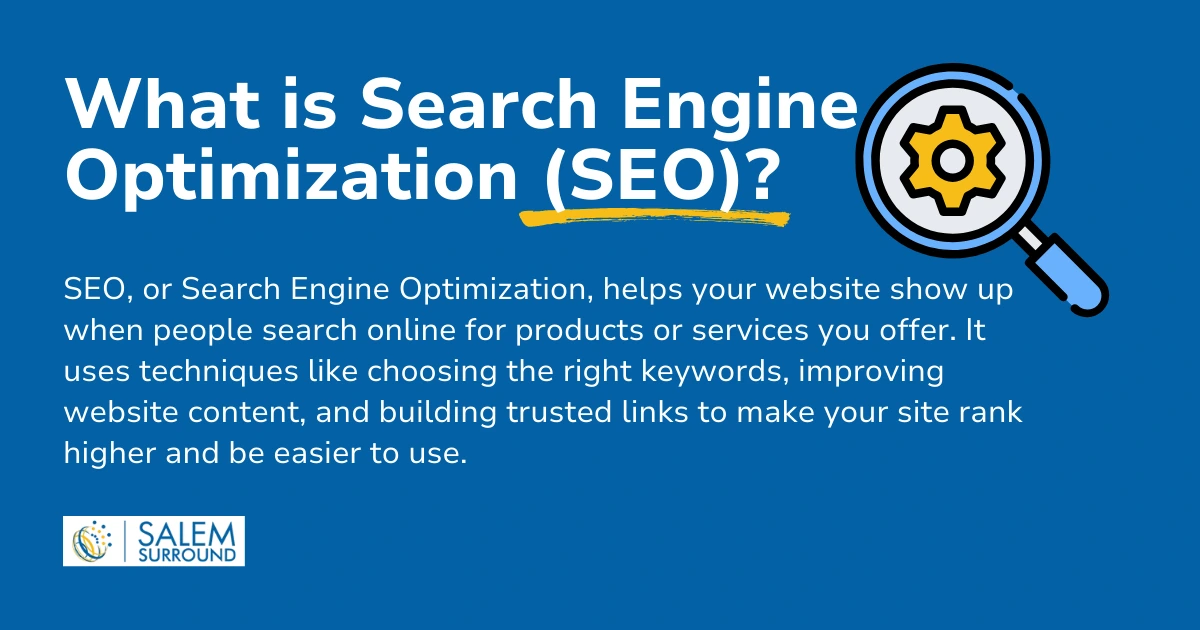
Pay-Per-Click Advertising (PPC)
PPC advertising is where you pay only when someone clicks on your ad. These ads appear on platforms like Google, Bing, or social media, placing your business at the top of search results or in front of your target audience. PPC allows for precise targeting, so your ads reach the right people at the right time, making it a cost-effective way to gain immediate visibility and drive results.
Benefits:
- Immediate visibility for your business.
- High return on investment with smart keyword strategies.
- Only pay for actual clicks, ensuring cost efficiency.
- Reach the right audience with precise targeting.
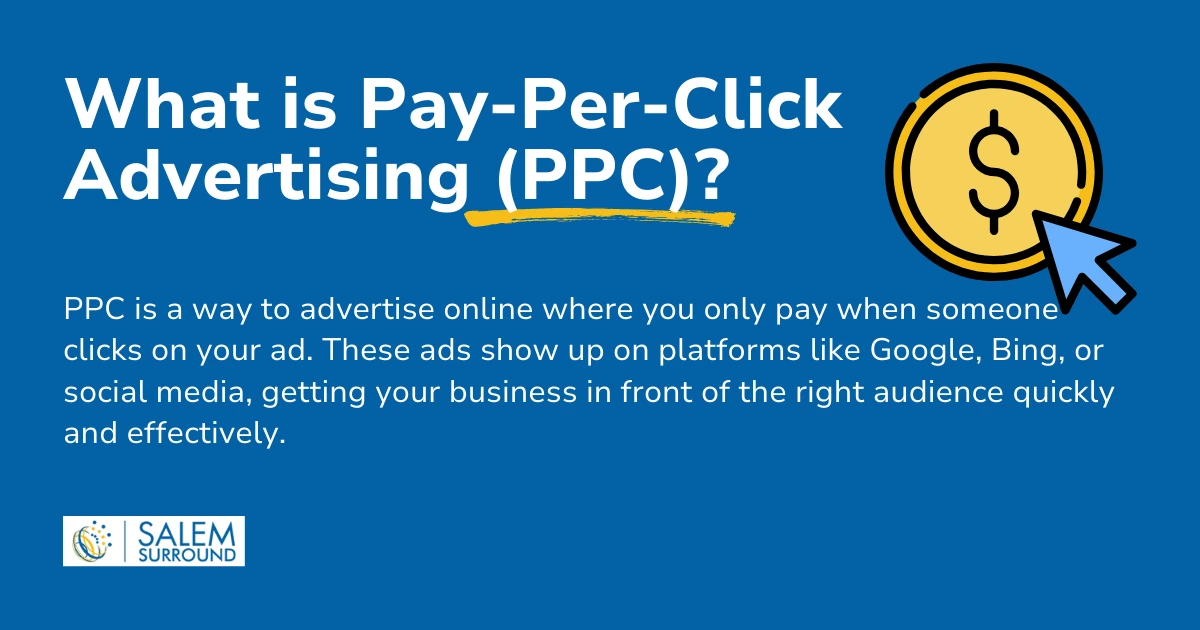
Display Advertising
Display advertising is a popular method for businesses to promote themselves online by placing visual ads on content websites. You’ve probably seen these ads on sites like ESPN.com, Yahoo.com, or FoxNews.com, where most pages contain several ad spaces. Unlike PPC ads, which appear in search results, display ads are shown directly on websites, offering a way to reach your audience while they browse online.
One of the biggest advantages of display advertising is its versatility in targeting. You can tailor your ads to reach specific audiences using a variety of advanced methods, including:
- Behavioral Targeting – Reaching users based on their browsing habits.
- Contextual (Keyword) Targeting – Matching ads to relevant website content.
- Intent Targeting – Connecting with users based on their online actions.
- Retargeting – Reminding past visitors about your business.
- Lookalike Marketing – Finding new audiences similar to your existing customers.
- Geofencing – Targeting users within a specific geographic area.
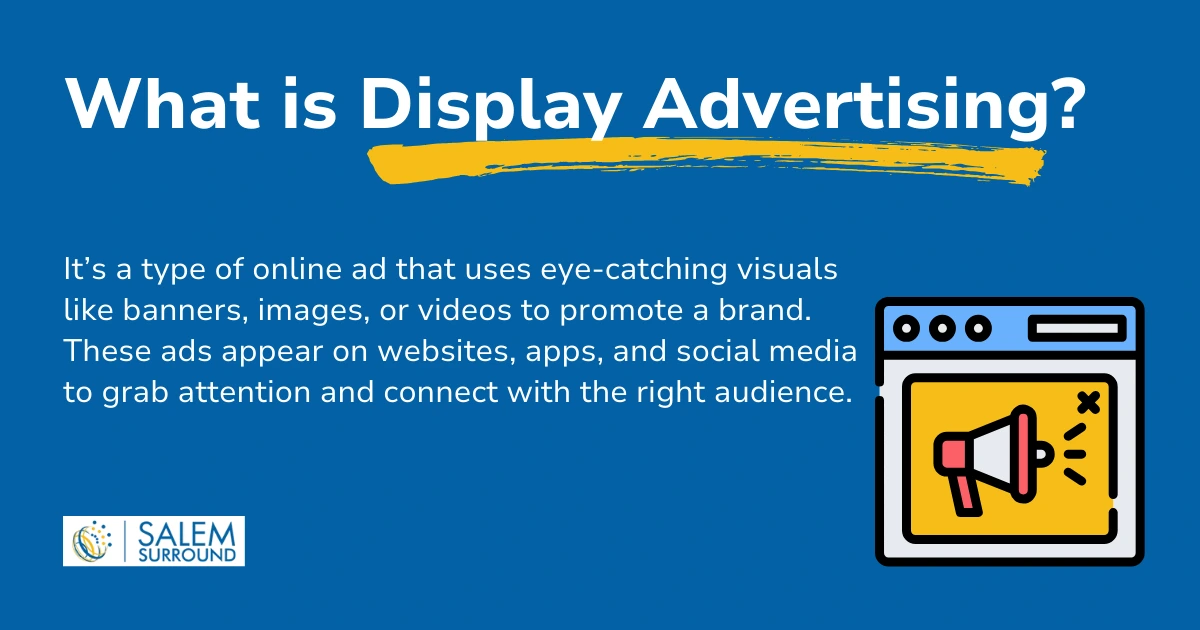
Social Media Marketing
Social media marketing is all about connecting with your audience where they already spend much of their time—on platforms like Facebook, Instagram, and X (formerly Twitter). By using a mix of ads and organic content, it helps build your brand’s presence, foster engagement, and drive real results like increased traffic and sales. Different platforms offer unique opportunities, like Facebook for creating brand awareness, Instagram for showcasing visual stories, and LinkedIn for making professional B2B connections. A strong and positive social media presence is now a must-have for brands looking to stand out and connect with their audience.
Benefits:
- Boosts brand awareness and visibility.
- Encourages engagement and builds relationships with your audience.
- Drives traffic and increases conversions.
- Tailors content to reach specific audiences on each platform.
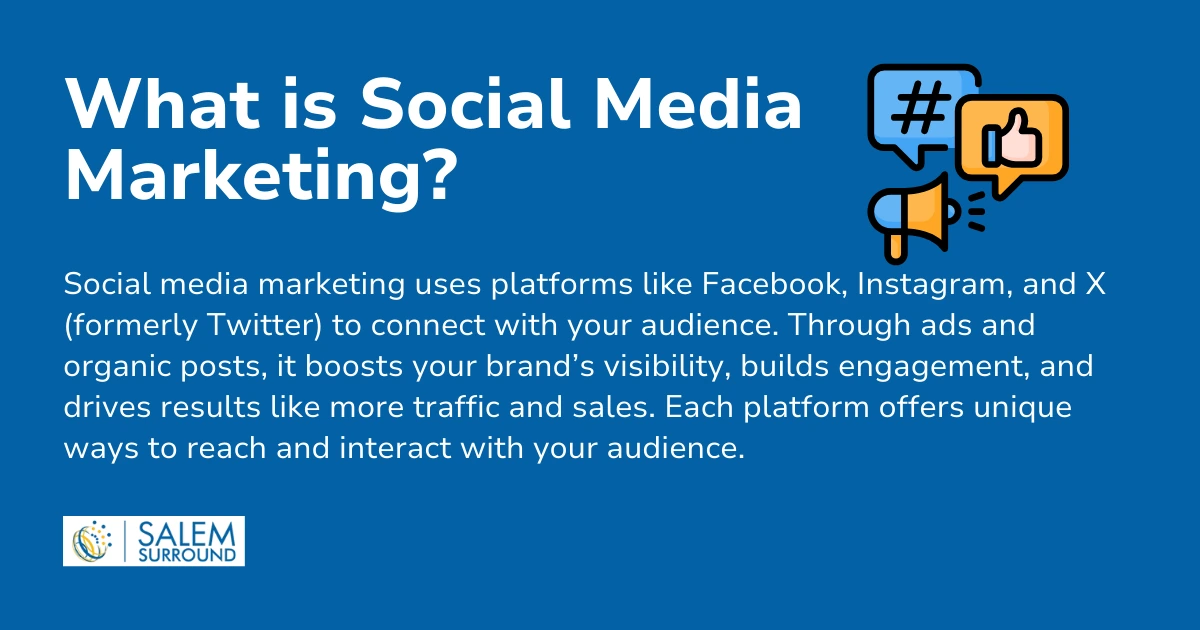
Video Marketing and Advertising
Video marketing has become one of the most effective ways to connect with audiences and boost engagement. When done well, it tells a story that captures attention and leaves a lasting impression. Videos are not just about visuals—they're a way to share your brand's personality, build trust, and spark interest.
One major platform for video marketing is YouTube, where millions of users consume video content daily. YouTube relies heavily on advertising, using formats like display ads and pre-roll ads—those short, unskippable clips that play before videos. These ads can make a big impact by reaching viewers already engaged with content they care about, making YouTube a powerful tool in any marketing strategy.
Advertising on Connected Television
Another exciting development is advertising on Connected TV (CTV). With more people streaming content on platforms like Netflix, Pluto TV, and other digital services, traditional cable TV is no longer the dominant player. Connected TVs and devices used for streaming content have opened up new ways to reach viewers on their terms. Ads can now appear during streamed shows or movies, reaching audiences where they spend their time. It’s a growing area of advertising, and the shift toward digital TV services means more opportunities to connect with your audience in innovative and effective ways.
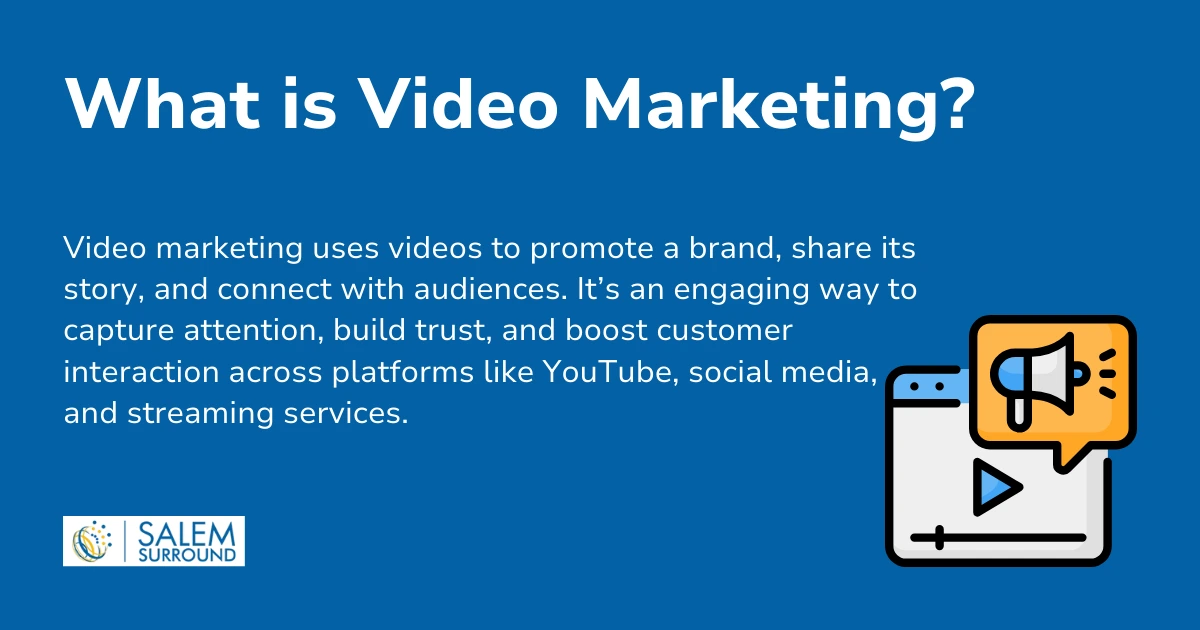
Podcast Marketing
Podcast marketing is an increasingly effective way for small and large businesses (and entrepreneurs!) to connect with audiences in a personal and engaging way. With millions of people listening to podcasts every day, this medium offers some pretty unique opportunities to share your message. Podcasts cover a wide range of topics, meaning you can target audiences with specific interests or demographics. Podcast ads tend to just feel more natural, whether it’s dynamic ads customized for each listener or host-read ads. Host-read ads really stand out because they tap into the trust and connection listeners already have with their favorite hosts—kind of like a personal endorsement.
Benefits:
- Reaches targeted audiences with specific interests.
- Creates a personal and relatable advertising experience.
- Leverages the trust between podcast hosts and their listeners.
- Engages a growing audience of regular podcast consumers.
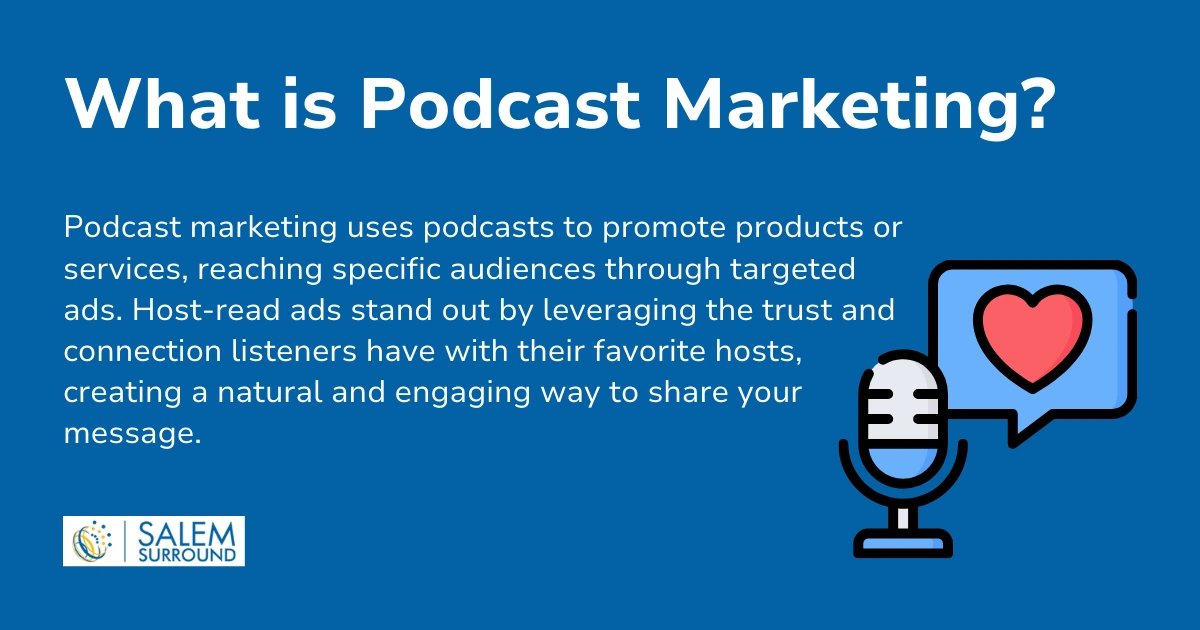
Content Marketing
Content marketing focuses on creating and sharing valuable content—like blog posts, videos, and articles—that helps attract and connect with your target audience. Instead of directly pitching products or services, this approach provides useful information that builds trust, educates readers, and nurtures long-term engagement. By offering useful insights, you can develop stronger relationships with your audience while subtly guiding them toward taking action, such as visiting your website or making a purchase.
Your website's content plays a big role in this strategy. Not only does it draw visitors in, but it also enhances your search engine rankings, helping your business stand out online.
Enhance Your Online Visibility with Expert SEO Content Writing Services
Benefits:
-
Improves SEO
-
Drives engagement
-
Supports brand trust
-
Generates leads
-
Educates your audience
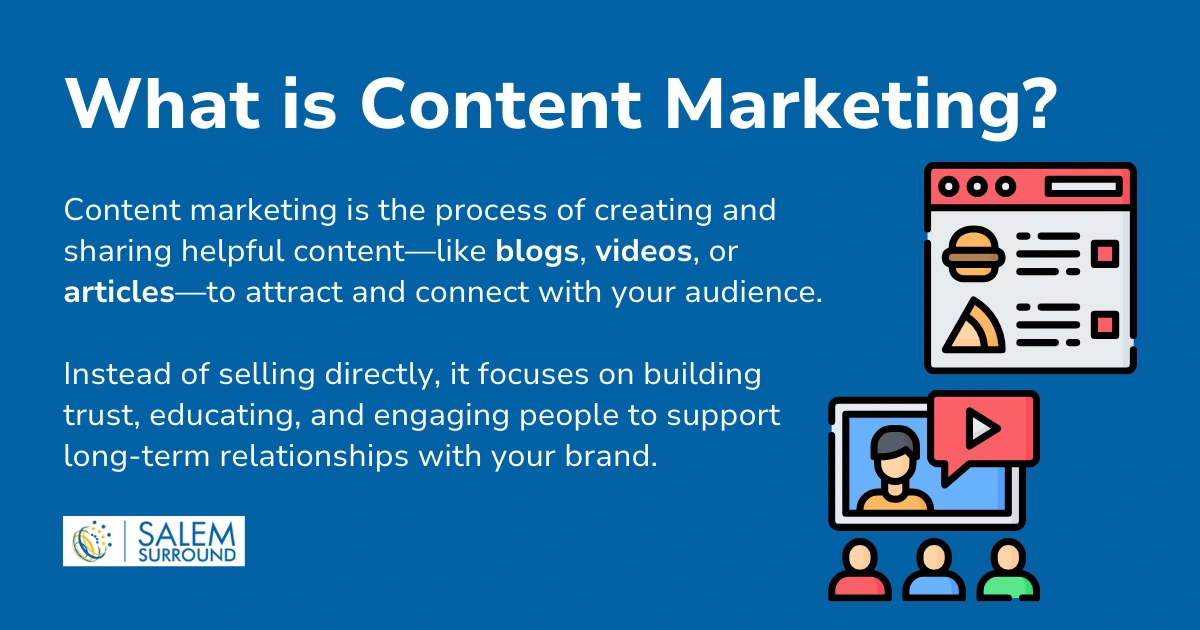
Native Advertising
Native advertising blends ads naturally with the content around it. The idea is to make the ad feel less like a traditional advertisement and more like part of the platform’s regular content. This approach focuses on providing value first—like information or entertainment—before introducing any promotional elements. By creating ads that match the format and tone of the surrounding content, native advertising aims to engage the audience in a way that feels seamless and unobtrusive. At the same time, it remains clear that the content is paid for, ensuring transparency while building trust with the audience.
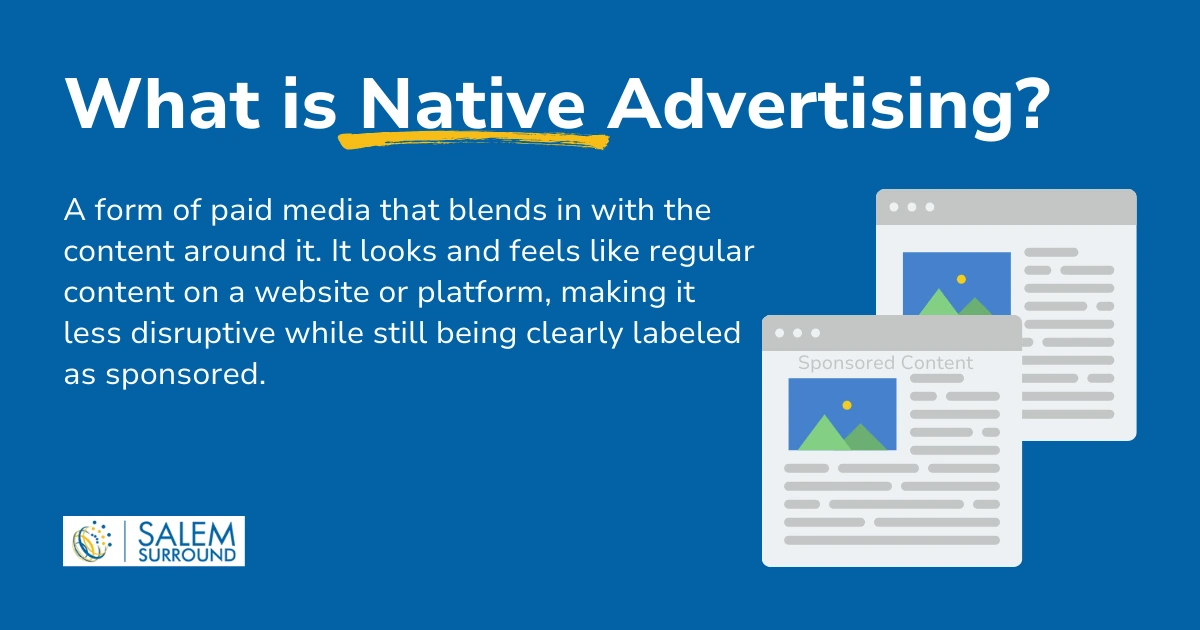
Email Marketing
Email marketing is a way to connect with your customers directly through their inbox. Unlike other forms of outreach, email gives both small and large businesses the ability to customize messages, making communication feel personal and relevant. It’s not just about promoting your products or services; it’s also about staying in touch, delivering helpful information, and building relationships that last over time.
To make email marketing successful, it’s important to create emails that are engaging and valuable. This involves techniques like crafting messages that spark curiosity, designing newsletters that avoid spam folders, and using powerful, clear language that encourages action.
Benefits:
-
Highly personalized messaging
-
Cost-effective
-
Builds relationships
-
Keeps customers informed
-
Drives action
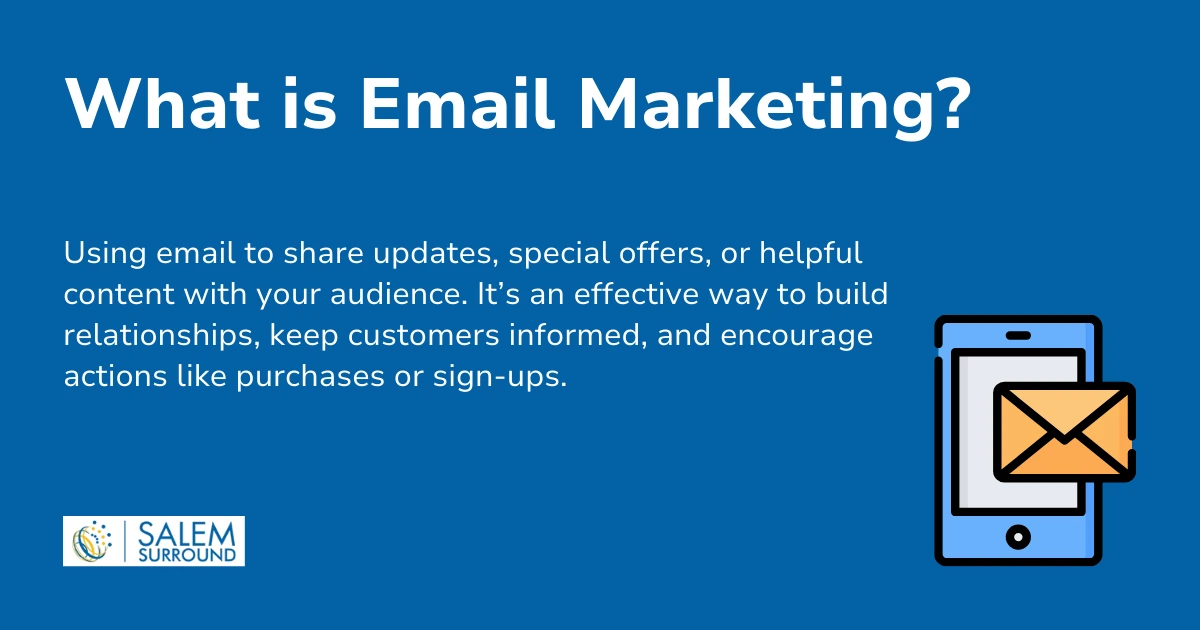
Digital Presence and Online Reputation Management
It's all about shaping how your business is perceived online. Reputation management involves monitoring and improving the way customers see your brand across websites, social media, and third-party review platforms like Yelp. Why is it important? A strong and positive digital presence not only helps you build trust but can also have a HUGE impact on your success. After all, reviews and feedback often influence whether someone decides to do business with you.
A proactive approach to reputation management ensures that you’re in control of your brand’s image. That means overseeing your business listings, helping generate positive reviews, responding to customer feedback constructively, and addressing issues before they escalate. It’s about showing your customers that their voices are heard and valued.
Benefits:
- Builds trust
- Encourages more positive reviews
- Manages negative reviews effectively
- Improves customer relationships
- Strengthens your digital presence
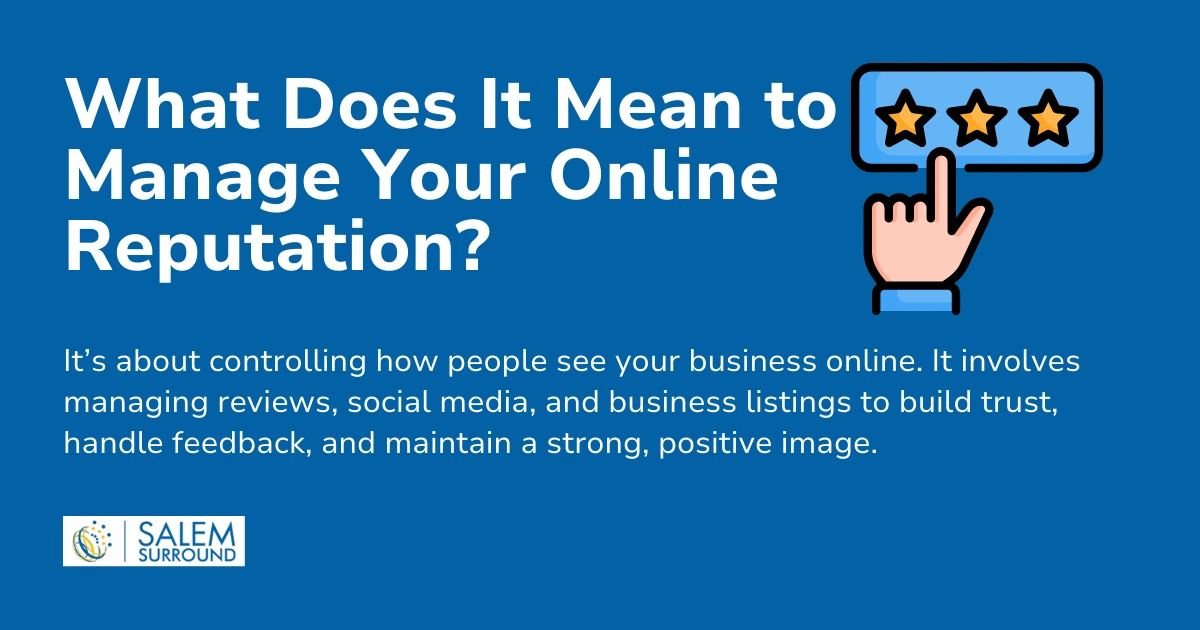
Benefits of Digital Marketing and Why It’s Important
Why is digital marketing so important?
Because modern businesses need to keep up with today’s consumers!
Look at it this way: Over 5.6 billion people, worldwide, own a cell phone. It’s reported that 5.3 billion people use the Internet. And, a whopping 4.95 billion people spend substantial time on social media.
All of those stats are telling us the same important thing: That nearly 70% of the world’s population is online.
So, your business should be too.
Digital marketing has revolutionized the way businesses connect with audiences. In an era where consumers are constantly online, digital marketing has become an indispensable tool for small and large businesses alike who want to thrive.
Here are just a few of the AMAZING benefits of digital marketing to consider:
1. Broad Reach
No geographical boundaries hold you back! When you publish content or an ad online, it becomes accessible to people everywhere regardless of their actual location (unless you’ve purposely set specific limitations, of course!).
2. Cost Efficiency
Digital marketing solutions have considerably lower overhead costs than traditional methods. Say goodbye to the hefty price tags of TV commercials and billboard rentals. Instead, creating content for social media or a website is significantly more affordable - not to mention, enduring! A piece of content can live on the Internet forever, whereas it’s safe to say that a newspaper hits a recycle bin sooner or later.
3. More Targeted Possibilities
Unlike traditional ad mediums like TV, magazines, or billboards, where you have limited control over the audience that sees your ad, digital marketing allows you to carefully target specific demographics if you so choose.
4. Compete with Larger Brands
Digital marketing provides small businesses with the opportunity to compete with larger brands in their industry. Even without substantial financial resources! For example, SEO efforts are one avenue that won’t cost anything more than time.
5. Measurable Results
It’s possible to measure the ROI for just about anything digitally. You can use tools like Google Analytics to track web page views, conversions, and leads. Most social media platforms provide this kind of data too. This info can help you make informed, real-time adjustments to campaigns that may not be performing how you’d like them to. It can also help you prioritize future strategies and campaigns.
6. Engagement
Online channels allow you to engage with your audience at every stage of the path to a purchase. Utilizing digital platforms such as email, social media, and content marketing presents a valuable opportunity to foster ongoing engagement and cultivate interest in your products and services. A prime example of this is writing a helpful blog on your website. People read it, learn about your product or service, and come back for more. It's like having an ongoing conversation instead of just shouting once. This builds trust and makes consumers more likely to buy from you.
7. Flexibility
The real beauty lies in flexibility and adaptability. Unforeseen circumstances can arise and adjustments to your campaign may become necessary. Whether it's a faulty assumption, or an unexpected audience response, the ability to make changes along the way proves invaluable, sparing you from starting over completely. This advantage becomes even more apparent when compared to traditional marketing methods like mailers or billboard advertising. Digital marketing allows for easy modifications, enabling you to swiftly adjust or pause an online ad that isn't yielding the desired outcomes. If your billboard isn’t producing the results you want, well, you can’t hit the pause button for that - you’re just plain old stuck.
How's Your Brand's Digital Presence? Find Out with Your FREE Digital Marketing Report
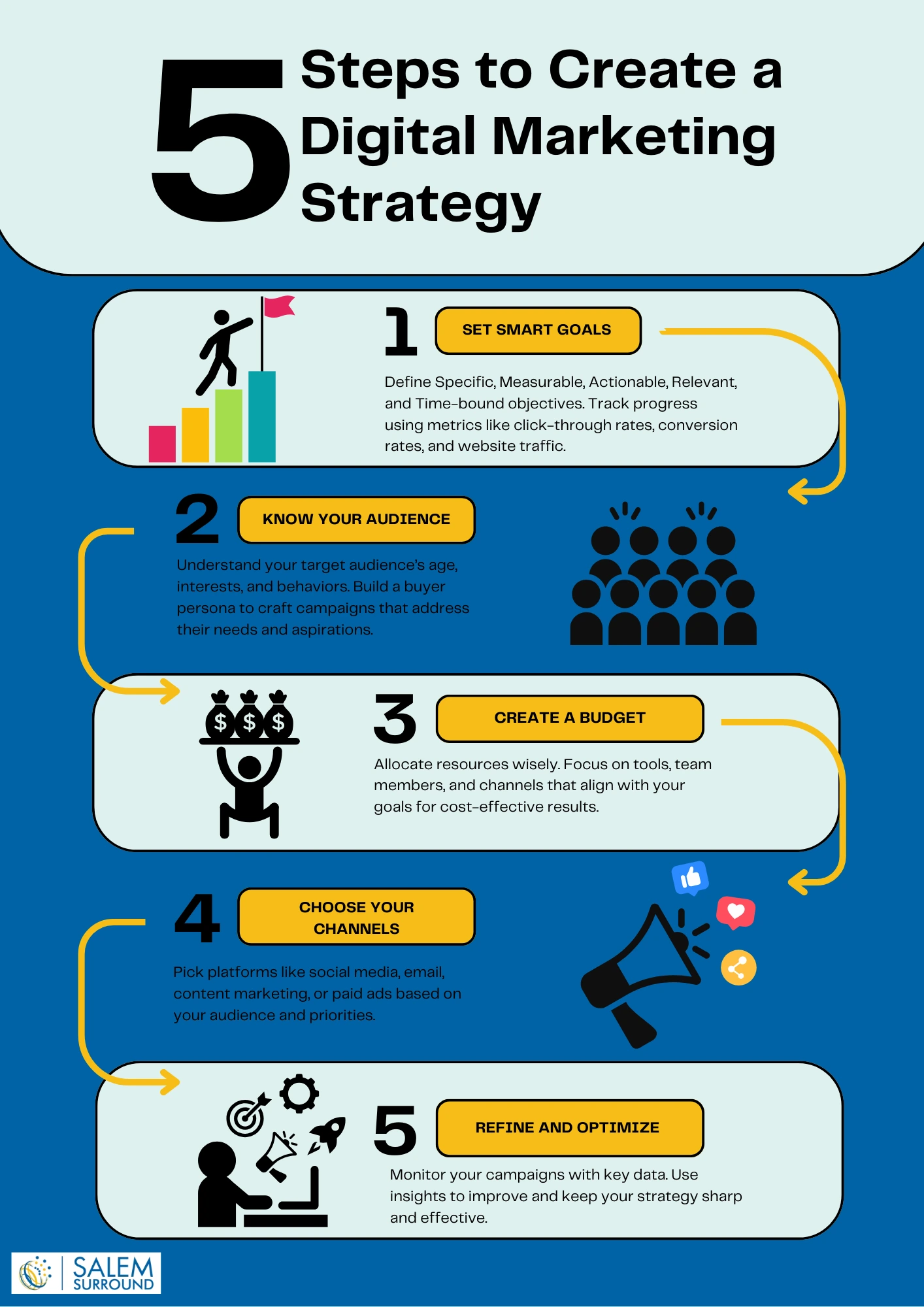
How to Create a Digital Marketing Strategy
When it comes to digital marketing, having a solid plan can make all the difference. Without all the right pieces in place, you might end up missing opportunities and getting results that fall short of what you hoped for. That’s why it’s so important to take a thoughtful approach, making sure your strategy lines up with your specific goals. Curious about how to pull it all together? Let’s break down the key steps to building a digital marketing strategy that sets your business up for success online.
1. Identify and Set Your Goals
Steer clear of vague or broad objectives that lack measurability and actionability. Goals like "increase social media followers" or "drive thousands of people to your website" may sound appealing, but they don't actually provide a clear roadmap for your team or effectively measure success. To be sure your goals are effective, they should be SMART. SMART stands for Specific, Measurable, Actionable, Relevant, and Time-bound. Your digital marketing goals should be specific in nature, measurable in terms of progress and success, actionable by providing clear steps to achieve them, relevant to your business objectives, and time-bound to create a sense of urgency.
For example:
Instead of “increase blog traffic,” your SMART goal should be, “increase organic website traffic by 20% over the next six months by optimizing on-page SEO and publishing five new blog posts per month.”
Your goal should be measurable using key performance indicators (KPIs). KPIs are metrics used to evaluate the progress and success of a goal. KPIs provide a way to measure performance, track progress, and make data-driven decisions. KPIs serve as a benchmark for progress, highlight areas of improvement, and help organizations stay focused on their strategic priorities. Here are a few KPIs you’ll likely want to use:
Click-Through Rate (CTR)
- Measure the effectiveness of online advertising.
- Calculate the percentage of people who clicked on an ad out of those who saw it.
- Helps gauge the success of ad campaigns and optimize strategies.
Conversion Rate
- Go beyond clicks to measure actual actions taken by users.
- Compare the percentage of people who completed desired actions (e.g., making a purchase) to the total audience reached.
- Provides insights into the effectiveness of ads or promotions in driving conversions.
Social Media Traffic
- Track interactions with company social media profiles.
- Monitor likes, follows, views, shares, and other measurable actions.
- Understand engagement levels and the impact of social media efforts on brand awareness and reach.
Website Traffic
- Monitor the number of visitors to a company's website within a specific time frame.
- Evaluate the effectiveness of marketing initiatives in driving traffic.
- Identify trends, assess campaign performance, and make data-driven decisions for website optimization.
2. Identify Your Audience
Knowing your audience isn't just a good idea, it's the difference between a bullseye and a miss. Your target audience is the specific group of people you want to reach through your campaign, characterized by shared attributes like age, gender, or buying behavior. By gaining a comprehensive understanding of your target audience, you can make informed decisions regarding the most effective digital marketing services and solutions to utilize, as well as useful information to incorporate into your campaigns.
Here's where we talk about the buyer persona: your ideal customer. Conduct surveys, analyze your existing customer base, and, most importantly, listen to their stories. What are their aspirations? What keeps them up at night? What makes them tick? These insights will bridge the gap between your product and their desires.
Once you have all your audience details, you can tailor your campaigns to resonate with their dreams, address their challenges, and offer solutions that fit their priorities.
3. Create a Budget
Establishing a budget requires the deliberate allocation of resources aligned with your SMART goals. To ensure cost-effectiveness, avoid random spending across various channels and instead, focus on those most likely to yield your desired outcomes. Consider these factors to create a well-rounded and realistic digital marketing budget that maximizes resources and contributes to the achievement of your goals:
Forecasted Budget
Create a comprehensive outline of the resources and tools required for content production and paid ads, as well as the potential need for hiring freelancers or contractors.
Employees
Evaluate the current team members in your marketing department and decide if additional personnel such as freelancers or contractors are necessary. Additionally, consider whether employees from other departments can be cross-trained or contribute to marketing efforts in any capacity.
Available Resources
Review the current tools available to you and determine which ones are essential for successful marketing campaigns and tracking. Assess if any additional tools need to be acquired.
Existing Content
Identify the content pieces within your library that can be repurposed or reused, reducing the need for new content creation.
4. Select Your Digital Marketing Channels
From content marketing to PPC campaigns, and everything in between - there is an extensive range of digital marketing solutions at your disposal. However, the selection of which channels to utilize should be driven by careful consideration of your specific goals, target audience, and available budget.
To choose the most appropriate services for your business, align your objectives with the strengths and characteristics of each channel. Consider your goals - whether they are focused on increasing brand awareness, driving website traffic, generating leads, or boosting sales. Also, analyze your target audience - their preferences, behaviors, and online habits. Finally, factor in your budget and ensure that the chosen channels offer a cost-effective and efficient return on investment.
5. Refine and Optimize
To truly refine and optimize your digital marketing efforts, it's essential to analyze the data generated by your campaigns. By carefully examining your KPIs, you can gain valuable insights into what worked well and areas where improvements can be made.
Get Help Creating My Digital Marketing Strategy
Does Digital Marketing Work for All Businesses?
Yes, digital marketing can work for businesses in just about any industry. The core idea is pretty straightforward—it’s about understanding what your audience needs and finding the best ways to connect with them online.
But here’s the thing—success in digital marketing isn’t one-size-fits-all. What works for one business might not be the best approach for another. It’s about customizing your strategy to fit the unique aspects of your industry, your brand, and most importantly, your audience. When you take the time to truly understand your customers and adapt as needed, digital marketing becomes a powerful way to grow your brand, reach the right people, and meet your goals—no matter what line of work you’re in.
What Is a Digital Marketing Agency?
A digital marketing agency is a team of pros who specialize in helping businesses grow their online presence, generate leads, and increase revenue. They use tools like social media, SEO, content creation, and online ads to get your brand noticed. Some agencies even have full-stack marketers—versatile experts who can handle everything from strategy to execution across multiple digital platforms.
Whether you're a small business just starting out or a larger company aiming to scale your online presence, partnering with a digital marketing agency can be essential to achieving your success.
If I Hire a Digital Marketing Agency, Who Will I Get?
When you bring a digital marketing agency on board, you're enlisting a team of specialists skilled in boosting brand awareness and generating leads. Here's who you’ll get:
1. An SEO Specialist
- Main KPIs: Organic traffic
- Responsibilities: SEO specialists focus on improving a business's ranking on search engines like Google and Bing. They employ various strategies to enhance organic traffic and work closely with content creators to ensure high-quality content that meets Google's standards. They also collaborate with social media teams to optimize content distribution.
2. A Content Marketing Specialist
- Main KPIs: Time on page, overall blog traffic, YouTube channel subscribers
- Responsibilities: Content marketing specialists are skilled digital content creators. They manage blogging calendars, develop content strategies, and may incorporate video content. They collaborate with other departments to align promotional content with products and campaigns across all digital channels.
3. A Social Media Manager
- Main KPIs: Follows, Impressions, Shares
- Responsibilities: Social media managers oversee social media platforms, establishing posting schedules for written and visual content. They engage with followers, attract new followers, and monitor key metrics such as follows, impressions, and shares. They often work closely with content marketing specialists to develop effective content-sharing strategies.
4. Marketing Automation Coordinator
- Main KPIs: Email open rate, campaign click-through rate, lead generation, and conversion rates
- Responsibilities: Marketing automation coordinators assist in selecting and managing software that tracks customer behavior and measures business growth. They ensure the seamless execution of various marketing operations by grouping them into individual campaigns. They track performance indicators such as email open rates, campaign click-through rates, and lead generation conversion rates.
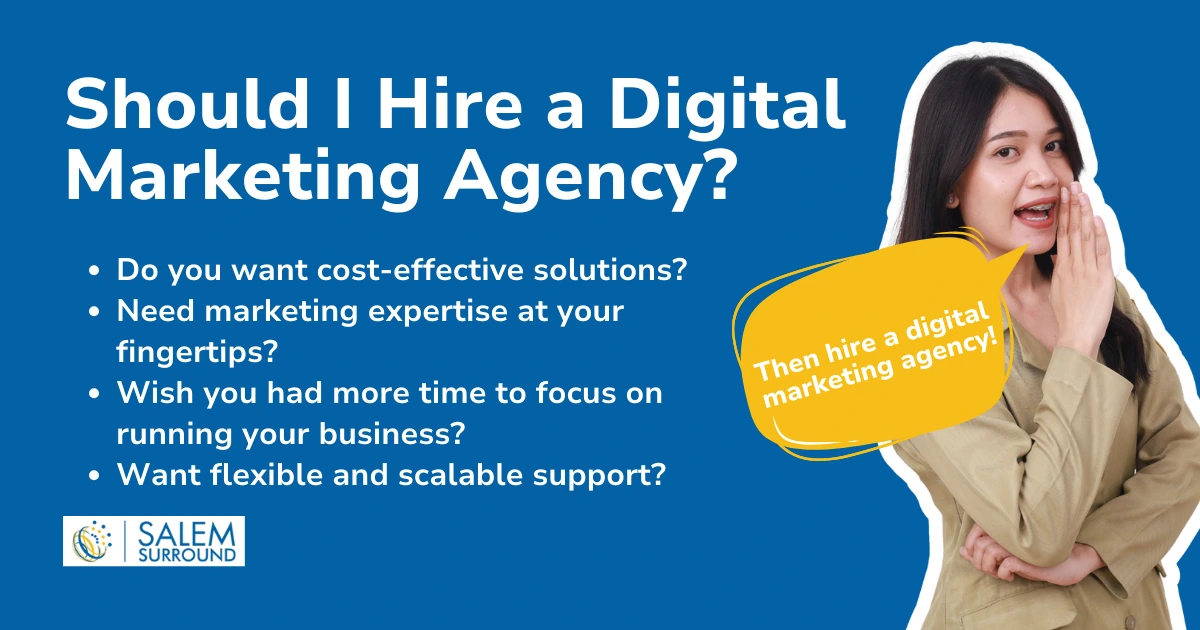
Should I Hire a Digital Marketing Agency for My Small Business?
Running a business means you’ve got a lot on your plate—from managing day-to-day operations to serving your customers and everything in between. When it comes to growing your business online, the digital world can feel a bit overwhelming. That’s where a digital marketing agency like Salem Surround comes in. But is hiring an agency the right move for your business? Let’s break it down. Here’s what Salem Surround can do for you:
- Cost-Effective Solutions: Hiring and training an in-house marketing team can put a strain on your budget. With Salem Surround, you’re not paying for full-time salaries or benefits. Instead, you get access to a whole team of professionals without the overhead costs—allowing you to focus your budget where it counts.
- Expertise at Your Fingertips: Why settle for one marketing specialist when you can have a team of experts on your side? Whether it’s social media management, SEO strategies, content creation, or running ad campaigns, Salem Surround offers a full range of skills. Our team knows the ins and outs of digital marketing, so you don’t have to figure it out alone.
- Built-In Experience: We’ve worked with businesses just like yours across a range of industries since 2018. That means we’ve already fine-tuned approaches that work, and we bring that experience directly to your campaigns. From small local businesses to larger organizations, we know how to get results tailored to your goals and audience.
- Time to Focus on What You Do Best: Your time is valuable. By teaming up with Salem Surround, you get to spend more time running your business and less time trying to handle marketing. We’ll take care of the strategy, execution, and tracking, so you can focus on what matters most to your business.
- Flexible and Scalable Support: Your business is unique, and we get that. Whether you’re just starting with email campaigns or ready to go big with ads, we make our services fit your goals. Need to scale up? No problem. Want to switch directions? We’ve got you. It’s all about adapting to meet your needs.
Take Your Digital Presence to the Next Level
Digital marketing isn't a luxury—it's a necessity in today's digital-first world. At Salem Surround, we empower businesses of all sizes to achieve their marketing goals through customized, results-driven strategies.

